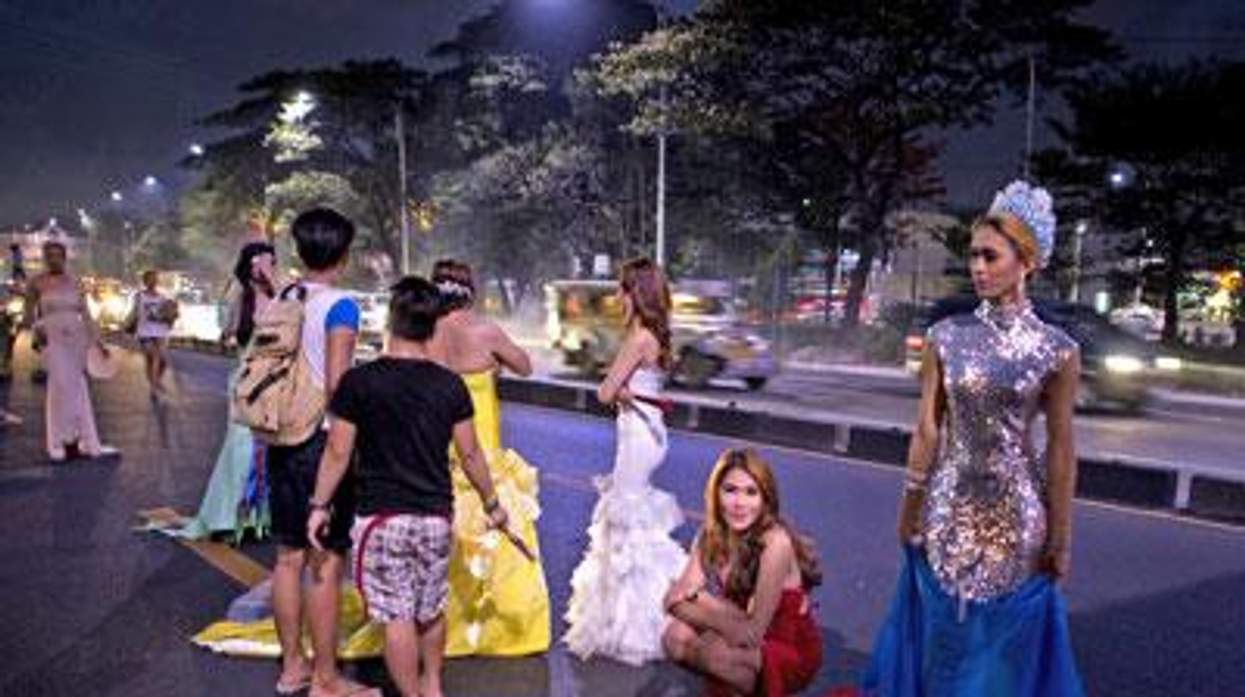A new regional report from the International Lesbian and Gay Human Rights Campaign pulls the veil off violence and oppression as experienced by women and transgender individuals in Asia, to reveal some surprising facts.
Titled "Through The Lens: Violence Against Lesbians, Bisexual Women and Trans People in Asia," the report uncovers ways in which these individuals, who in many ways exist as minorities within an already marginalized group of women, are further oppressed by the region's social, cultural, and political mores which regulate their existence further. To help unpack the report's broad lessons, The Advocate caught up with Grace Poore, IGLHRC's regional program coordinator for Asia and Pacific Islands.
The Advocate: Why does this report exclude gay men?
Grace Poore: The research that IGLHRC coordinated on violence against lesbians, bisexual women and transgender individuals in Japan, Malaysia, Pakistan, Philippines, and Sri Lanka was a response to the general invisibility of issues relating to lesbians, bisexual women, and gender-variant individuals in these five countries. For instance, lack of data on violence against LBTs and lack of awareness and understanding about the experiences of LBT people dealing with violence were glaring reasons for the study to be undertaken. We needed to uncover violence occurring to people who were not only marginalized in larger society, but also marginalized within the LGBT communities.
What is the most important takeaway from your report?
There are several important takeaways from the study. First, LBT people are denied access to spaces that are specifically set up to assist people needing emergency services to deal with violence, such as domestic violence shelters, medical services, counselors, support groups, and women's nongovernmental organizations.
Second, the state has neglected to stop and prevent violence against lesbians, bisexual women and people with nonconforming gender. The family in Asia plays an immensely important role in regulating gender and sexuality. And family is poorly regulated or not regulated at all when it uses violence -- physical violence, sexual violence, emotional violence -- to correct gender and sexual nonconformity.
Third, laws that are already in place to prohibit rape in general, sexual harassment in the work place, domestic violence, intimate partner violence, and discrimination do not extend protections to LBT people because the language of the laws is exclusionary, the application of the laws is discriminatory, and even if the laws could technically be used by LBT people, there are other laws in place that criminalize homosexuality and nonconforming gender expression, and puts LBT people at risk for even reporting violence and seeking external help.
What can people inside and outside the problem countries do to help improve the lives of LBT people in Asia?
Inside the countries involved in this study, people need to take heed that discrimination against people with nonconforming sexual orientation, gender identity and gender expression contributes to violence and keeps it hidden. And programs to address violence and discrimination against women, ethnic minorities, people with disabilities, indigenous people, and other marginalized people must integrate sexual orientation and gender identity into their work. Antiviolence groups, antipoverty groups, and groups pushing for gender equality should not distance themselves from LGBT issues generally and LBT issues specifically.
How do the parental or familial abuses against LBT people in Asia differ from the so-called "honor-killings" and punishments by family members in the Mideast that we have heard so much about in recent years?
Although this was not documented in this study, we have heard from a researcher in Pakistan that killings do take place in some families, particularly if family members view a lesbian or trans individual as an abomination. What's important, however, is to recognize that the presence or absence of killings in the name of honor is not the only indicator of how serious the violence is against lesbians, bisexual women, and gender-variant people. In the five-country study we reported on, family members, especially parents and dominant male members of the family, carried out beatings, prolonged silent hostilities, regular and frequent condemnation and verbal denigration, prevented communicating with friends, or shamed and punished individuals whose sexual orientation and gender expression did not conform to family and societal expectations.
As reported by some of the LBT people interviewed for the study, violence by their families became a foundational setting for violence later on in life.
As documented in the report IGLHRC released in May, violence by family members drove some LBT people to run away from home at a young age, which disrupted their schooling and contributed to loss of employment opportunities. Family and partner violence contributed to severe depression, self-hatred, isolation, chronic physical illnesses, and even attempted suicide to stop the violence.
Is it possible for LBT people to experience lives of security, dignity and respected rights even in conservative, religious societies?
In societies where conservative or hard-line religious groups use religious discourse to repress the rights of women and girls, conditions are worse for gender-nonconforming women (like butch lesbians, tomboys, trans women) because their visibility makes them vulnerable to being targeted. When conservative religious groups have the support of their government leaders, then the environment of intolerance and hate gets ramped up, and the general public has a harder time standing up to those who spread intolerance, hate and repressiveness. Media also plays a big role in how people are perceived and treated.
In contexts where being visible poses a risk, and being in the closet compounds the violence one is experiencing, it takes a lot of personal inner strength to survive. As the LBT individuals in Malaysia, Philippines, Japan, Pakistan, and Sri Lanka reported in the study, they coped by having supportive LBT friends and allies, including teachers, school guidance counselors, and therapists. They also coped by escaping into work, school, sports, movies, and books. And many talked about coping with drugs and alcohol. I want to stress that the takeaway from the study is not that life is bleak and hopeless for LBT people living in societies that don't accept their gender and sexual nonconformity -- this would be a disservice to individuals who have survived and continue to defy rejection and hate.
What we need to do is demand accountability from service providers who discriminate, from governments that don't care about human rights, from human rights commissions who should be investigating violence and discrimination against all marginalized people, and from the United Nations that monitors and pushes governments to advance gender equality.




































































Charlie Kirk DID say stoning gay people was the 'perfect law' — and these other heinous quotes